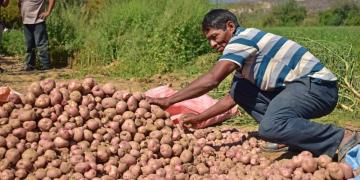Spain (A Limia): The potato harvest faces a week of uncertainty
The lack of ripening delays the harvest date, exposing the harvest to the risk of rain preventing it.

The flagship of agricultural production in the A Limia region navigated through "the perfect storm" during this year’s planting season, following heavy rainfall that flooded large portions of the farms in the spring, delaying planting.
These flooding events particularly affected the lands surrounding the Antela Lagoon, which took longer to drain, delaying entry into the farms. In many cases, the delay exceeded 20 days, allowing planting to begin in late May and well into June.
Adding to this delay were high temperatures—over 40 degrees—which burned the sprouts and reduced the number of tubers by more than 60%, creating a heterogeneous development within the same plot, where some potatoes are already ripe and others are still flowering.
On farms located outside the former lagoon, it’s now possible to harvest the potatoes planted in April, which had already completed their crop cycle. Julio Montero explains that on August 22, he began harvesting his farms spread across Porqueira, Ganade, and Lamas, estimating around 36 tons of Kennebec per hectare, slightly lower than the regional average of around 40 tons. "Production is a little lower than other years," he noted.
It is estimated that more than 75% of the cultivated land remains to be harvested, and the final stretch of the campaign is fraught with uncertainty. In these plots, the main problem is uneven tuber growth and differences in ripening. Julio explains that he has 14 hectares left "and they’re halfway there, so it can go through, whether it’s hot or it starts to rain and it doesn’t stop."
The crux of the matter lies in timing: the lack of rainfall in recent months has caused the soil to be very dry, while the potato has not yet developed a layer of skin thick enough to prevent damage during harvesting, which would cause storage problems. Now, these potatoes often need more time to fully ripen, so moderate rainfall would be advisable, softening and cooling the soil and allowing the potato to develop its skin.
Víctor Cabido cultivates his plots on the Lagoa lands, and at the end of September he began harvesting his first hectares, which were planted late after the floods, in the hope that they would have enough yield to harvest. Víctor points out that, although quality and size expectations are good, if the weather is not favorable, production will be further reduced.
Servando Álvarez, technical director of Inorde, explains that the current data will "rarely" correspond to the final data, since these first farms that were planted "in tempo e forma" are producing within the norm, but the remaining 75% of A Limia suffered the consequences of the perfect storm, so its production will be reduced by the reduction of shoots and the lack of ripening due to the delay in planting.
“Many plots are still green, I estimate that the harvest will begin around October 15, and if it starts to rain on those dates, that is when the situation could get complicated,” says Álvarez. The challenge that farmers are facing right now boils down to a decision: “The question is whether I pick them now, and I am sure I will have problems in the warehouse, or I wait and risk that some of them will go too big or it will start to rain and I cannot pick them,” says Álvarez, “it is a difficult decision to make right now.”
"If the forecasts are met, if a dry autumn is maintained, there would be no problem, but less and less climate patterns correspond to historical ones, then let’s see when the wet season begins, if it starts in mid-October, we will have a problem," he said.
IXP Potato of Galicia
These problems are particularly prevalent in potatoes sold for industrial production, as several of these farmers confirm, the best plots are reserved for those protected under the Protected Geographical Indication (PGI) Pataca de Galicia, predominantly Kennebec.
José Manuel Gómez, president of the IXP, explains that this year the quality of the potatoes covered by the seal is "exceptional, both sanitary and organoleptic," and that they have a much more uniform size. Despite this, the president predicts a reduction, although "the quantity is difficult to quantify now," since if it rains again, "we run the risk of much of the production being affected."
Fuente: Traducido por Argenpapa de : La Region




